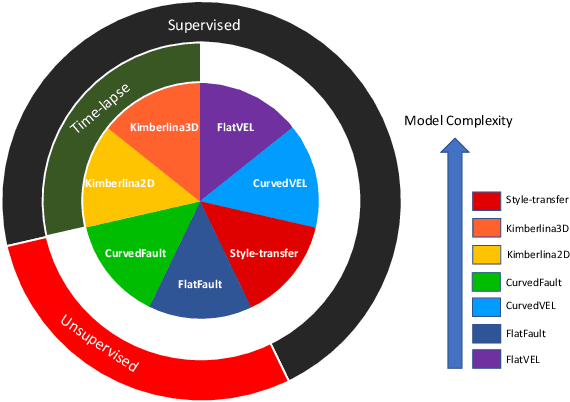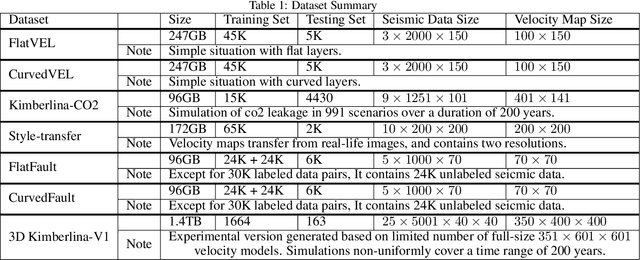Qili Zeng
OpenFWI: Benchmark Seismic Datasets for Machine Learning-Based Full Waveform Inversion
Nov 04, 2021



Abstract:We present OpenFWI, a collection of large-scale open-source benchmark datasets for seismic full waveform inversion (FWI). OpenFWI is the first-of-its-kind in the geoscience and machine learning community to facilitate diversified, rigorous, and reproducible research on machine learning-based FWI. OpenFWI includes datasets of multiple scales, encompasses diverse domains, and covers various levels of model complexity. Along with the dataset, we also perform an empirical study on each dataset with a fully-convolutional deep learning model. OpenFWI has been meticulously maintained and will be regularly updated with new data and experimental results. We appreciate the inputs from the community to help us further improve OpenFWI. At the current version, we publish seven datasets in OpenFWI, of which one is specified for 3D FWI and the rest are for 2D scenarios. All datasets and related information can be accessed through our website at https://openfwi.github.io/.
InversionNet3D: Efficient and Scalable Learning for 3D Full Waveform Inversion
Mar 25, 2021



Abstract:Recent progress in the use of deep learning for Full Waveform Inversion (FWI) has demonstrated the advantage of data-driven methods over traditional physics-based approaches in terms of reconstruction accuracy and computational efficiency. However, due to high computational complexity and large memory consumption, the reconstruction of 3D high-resolution velocity maps via deep networks is still a great challenge. In this paper, we present InversionNet3D, an efficient and scalable encoder-decoder network for 3D FWI. The proposed method employs group convolution in the encoder to establish an effective hierarchy for learning information from multiple sources while cutting down unnecessary parameters and operations at the same time. The introduction of invertible layers further reduces the memory consumption of intermediate features during training and thus enables the development of deeper networks with more layers and higher capacity as required by different application scenarios. Experiments on the 3D Kimberlina dataset demonstrate that InversionNet3D achieves state-of-the-art reconstruction performance with lower computational cost and lower memory footprint compared to the baseline.
 Add to Chrome
Add to Chrome Add to Firefox
Add to Firefox Add to Edge
Add to Edge